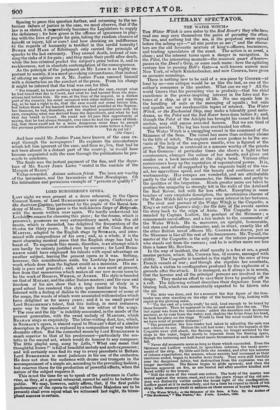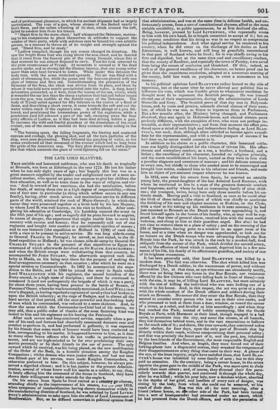LITERARY SPECTATOR..
THE WATER WITCH.*
THE Water Witch is own sister to the Red Rover; they who have read one may save themselves the pains of perusing the other. The sea, and nothing but the sea, is the perpetual seene spread before the aching eye—" nil nisi pontus ac aer r and the charac- ters are the old favourite mixture of king's-oficers, buccaneers, and trading speculators of the coast. The action is as usual, a chase ; and the interest turns upon a danger in navigation. In the Pilot, the interesting moment—the mauvais quart d'heure-- passes in the Devil's Grip, or some such name : here the agitating venture lies in passing Hell's Gate—a well-known narrow near New York, of which Knickerbocker, and now COOPER, have given us accurate soundings. There is nothing new to be said of a sea-piece by Coopea—at least by us—our critique would be as like the last, as one of the author's romances is like another. What can we say ? All the world knows that his prevailing vice is: prolixity—that his chief excellence is the power-inspiring interest in the fates and for- tunes of a ship, as of a thing of life. No one equals him in the handling of sails or the managing of squalls ; but sails and squalls are not inexhaustible topics of interest. The Water Witch, or the Enchanted Ship, may make a tolerably good melo- drama, as the Pilot and the Red Rover have done before it ; and, though the Pilot of the Adelphi has brought his vessel to its last anchor, may still amuse crowded houses. But we are tired of nautical novels. The log has been overhauled too often: The Water Witch is a smuggling vessel in the command of the Skimmer of the Seas. The vessel has more than ordinary claims to the title of witch. The captain and crew profess to be the ser- vants of the lady of the sea-green mantle, who is figured at the prow. The image is contrived in a manner worthy of the priests of San Gennaro : at particular times she shows a light on her countenance, changes the colour of her mantle, and gives out oracles on a book moveable at the ship's head. Various other contrivances keep up the reputation of supernatural power. It is, however, most of all supported by the exquisite build of the ves- sel, her marvellous speed, and the beauty and costliness of her workmanship. Her escapes are wonderful, and are attributable partly to the skill of the commander, the Skimmer, and partly to the qualities of the brigantine. -.Much greater pains are taken to produce the sympathy so strongly felt in the risks of the Ariel and the Red Rover, but with far less effect. Excepting in some touches of very exquisite description, the meretricious charms of the Water Witch fail to produce any warm interest in her fortunes. The rival and pursuer of the 'Water Witch is the Coquette, a Kings or rather Queen's ship —for the date ,;:,f the events carries the story back to the reign of Anne. The Coquette is com- manded by Captain Ludlow, the pendant of the Skimmer ; a consummate naval officer, and a fair match to the commander of the Water Witch. He is, moreover, an upright, honourable, but stem and unbending character, and, in short, exactly like all the other British naval officers Mr. COOPER has drawn, just as the Skimmer is like all the rest of his buccaneers. Mr. Trysail, the master of the Coquette, is the only one of' the inferior personages who stands out from the canvass ; and he is neither more nor less than a tamer Mr. Bowline.
In the way of incident, the chief novelty is a fire at sea, a great marine picture, which Mr. COOPER has, of course, managed with ability. The Coquette is boarded in the night by the crew of two French vessels of war ; and though she repulses her assailants, she falls a victim to conflagration produced by the explosion of a grenade after the attack. It is managed, as it always is in novels, i that the heroine and all the principal persons are involved in the danger. They make an effort to save their lives by pushing off in a raft. The following extract describes their departure from the blazing hull, which was momentarily expected to be blown into the air.
" The duty was done, and for a moment the fine figure of the free- trader was seen standing on the edge of the burning ship, looking with regret at the glowing mass. "Tis the end of a lovely craft,' he said, loud enough to be heard by those beneath. Then he appeared in the air and sunk into the sea. 'The last signal was from the ward-room,' added the dauntless and dexterous mariner, as he rose from the water; and, shaking the brine from his head, he took his place on the stage. Would to God the wind would blow, for we have need of greater distance I' "The precaution the free-trader had taken in adjusting the sails was not without its use. Motion the raft had none; but as the topsails of the Coquette were still aback, the flaming mass, no longer arrested by the clogs in the water, began slowly to separate from the floating spars, though the tottering and half-burnt masts threatened at each moment to fall.
" Never did moments seem so long as those which succeeded. Even the Skimmer and Ludlow watched, in speechless interest, the tardy move- ments of the ship. By little and little she receded, and after ten minutes of intense expectation, the seamen, whose anxiety had increased as their exertions ended, began to breathe more freely. They were still fearfully near the dangerous fabric, but destruction from the explosion was no longer inevitable. The flames began to glide upwards, and then the heavens appeared on fire, as one heated sail after another kindled and flared wildly in the breeze. " Still the stern of the vessel was entire. The body of the master was seated against the mizen-mast, and even the stern visage of the old sea- man was distinctly visible, under the broad light of the conflagration. Ludlow gazed at it in melancholy, and for a rime he ceased to think of his ship; while memory dwelt in sadness on thOse scenes of boyish happiness,
• The Water Witch ; or the Skimmer of the Seas. A Tale. By the Author of "The Borderers," " The Prairie," &c. 8 vols. London, 1830.
and of professional pleasures, in which his ancient shipmate had so largely participated. The roar of a gun, whose stream of fire flashed nearly to their faces, and the sullen whistling of its shot, which crossed the raft, failed to awaken him from his trance. " Stand firm to the mess-chest,' half whispered the Skimmer, motion- ing to his companions to place themselves in attitudes to support the weaker of their party, while with sedulous care he braced his own athletic person, in a manner to throw all of its weight and strength against the seat. 'Stand firm, and be ready.' "Ludlow complied, though his eye scarce changed its direction. He saw the bright flame that was rising above the arm-chest, and he fancied that it came from the funeral pile of the young Dumont, whose fate at that moment he was almost disposed to envy. Then his look returned to the grim countenance of Trysail. At moments it seemed as if the dead master spoke, and so strong did the illusion become, that our young sailor more than once bent forward to listen. While under this delusion the body rose, with the arms stretched upwards. The air was filler, with a sheet of streaming fire, while the ocean and the heavens glowed with one glare of intense and fiery red. Notwithstanding the precaution of the Skimmer of the Seas, the chest was driven from its place, and those by whom it was held were nearly precipitated into the water. A deep, heavy detonation proceeded, as it were, from the bosom of the sea, which, while it wounded the ear less than the sharp explosion that had just before issued from the gun, was audible at the distant capes of the Delaware. The body of Trysail sailed upward for fifty fathoms in the centre of a flood of flame, and describing a short curve, it came towards the raft and cut the water within reach of the captain's arm. A sullen plunge of a gun fol- lowed, and proclaimed the tremendous power of the explosion, while a ponderous yard fell athwart a part of the raft, sweeping away the four petty officers of Ludlow, as if they had been dust driving before a gale. To increase the wild and fearful grandeur of the dissolution of the royal cruiser, one of the cannon emitted its fiery contents while sailing in the void.
" The burning spars, the falling fragments, the blazing and scattered canvass and cordage, the glowing shot, and all the torn particles of the ship, were seen descending. Then followed the gurgling of water, as the ocean swallowed all that remained of the cruiser which had so long been the pride of the American seas. The fiery glow disappeared, and a gloom like that which succeeds the glare of vivid lightning fell on the scene."



























 Previous page
Previous page